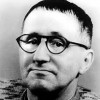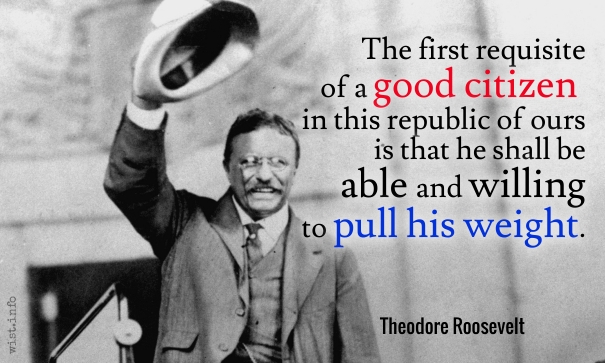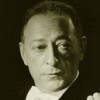The mind is a strange machine which can combine the materials offered to it in the most astonishing ways, but without materials from the external world it is powerless.
Bertrand Russell (1872-1970) English mathematician and philosopher
Conquest of Happiness, Part 2, ch. 11 “Zest” (1930)
(Source)
Quotations about:
participation
Note not all quotations have been tagged, so Search may find additional quotes on this topic.
The worst illiterate is the political illiterate. He hears nothing, sees nothing, takes no part in political life. He doesn’t seem to know that the cost of living, the price of beans, of flour, of rent, of medicines all depend on political decisions. He even prides himself on his political ignorance, sticks out his chest and says he hates politics. He doesn’t know, the imbecile, that from his political non-participation comes the prostitute, the abandoned child, the robber and, worst of all, corrupt officials, the lackeys of exploitative multinational corporations.
The trouble is that democracy works only when a good majority of citizens are willing to give thought and time and effort to their government.
Fletcher Knebel (1911-1993) American author
Seven Days in May, “Tuesday Afternoon” [Lyman] (1962) [with Charles W. Bailey II]
(Source)
Cities have the capability of providing something for everybody, only because, and only when, they are created by everybody.
Jane Jacobs (1916-2006) American-Canadian journalist, author, urban theorist, activist
The Death and Life of Great American Cities, Part 2, ch. 12 (1961)
(Source)
Writing, printing, and the Internet give a false sense of security about the permanence of culture. Most of the million details of a complex, living culture are transmitted neither in writing nor pictorially. Instead, cultures live through word of mouth and example. That is why we have cooking classes and cooking demonstrations, as well as cookbooks. That is why we have apprenticeships, internships, student tours, and on-the-job training as well as manuals and textbooks. Every culture takes pains to educate its young so that they, in their turn, can practice and transmit it completely. Educators and mentors, whether they are parents, elders, or schoolmasters, use books and videos if they have them, but they also speak, and when they are most effective, as teachers, parents, or mentors, they also serve as examples.
Jane Jacobs (1916-2006) American-Canadian journalist, author, urban theorist, activist
Dark Age Ahead, ch. 1 “The Hazard” (2004)
(Source)
Too many cooks may spoil the broth, but it only takes one to burn it.
Julia Child (1912-2004) American chef and writer
(Attributed)
Referring to the Women's Suffrage Movement, as quoted by Madeleine Bingham, Something's Burning: The Bad Cook's Guide (1968) [unverified]. Sometimes said to be in the Introduction to her Julia Child's Kitchen, (1975), but not found there.
This is supposed to be a participatory democracy and if we’re not in there participating then the people that will manipulate and exploit the system will step in there. So I’ve been a political activist all my life and I think in a large measure it’s because of the internment that we experienced fifty years ago.
George Takei (b. 1937) American actor, author, activist [ジョージ・タケイ, b. Hosato Takei]
Interview by Peter Anthony Holder, CJAD, Montreal (21 Nov 1994)
(Source)
The biggest threat to our democracy is indifference. The biggest threat to our democracy is cynicism — a cynicism that’s led too many people to turn away from politics and stay home on election day. […] So if you don’t like what’s going on right now — and you shouldn’t — do not complain. Don’t hashtag. Don’t get anxious. Don’t retreat. Don’t binge on whatever it is you’re bingeing on. Don’t lose yourself in ironic detachment. Don’t put your head in the sand. Don’t boo. Vote. You’ve got to vote.
Barack Obama (b. 1961) American politician, US President (2009-2017)
Speech, University of Illinois (7 Sep 2018)
(Source)
It falls to each of us to be those anxious, jealous guardians of our democracy; to embrace the joyous task we’ve been given to continually try to improve this great nation of ours. Because for all our outward differences, we, in fact, all share the same proud title, the most important office in a democracy: Citizen. Citizen. So, you see, that’s what our democracy demands. It needs you. Not just when there’s an election, not just when your own narrow interest is at stake, but over the full span of a lifetime.
Barack Obama (b. 1961) American politician, US President (2009-2017)
“Farewell Address,” Chicago (10 Jan 2017)
(Source)
Our democracy is threatened whenever we take it for granted. All of us, regardless of party, should be throwing ourselves into the task of rebuilding our democratic institutions. When voting rates in America are some of the lowest among advanced democracies, we should be making it easier, not harder, to vote. When trust in our institutions is low, we should reduce the corrosive influence of money in our politics, and insist on the principles of transparency and ethics in public service. When Congress is dysfunctional, we should draw our congressional districts to encourage politicians to cater to common sense and not rigid extremes. But remember, none of this happens on its own. All of this depends on our participation; on each of us accepting the responsibility of citizenship, regardless of which way the pendulum of power happens to be swinging.
Barack Obama (b. 1961) American politician, US President (2009-2017)
“Farewell Address,” Chicago (10 Jan 2017)
(Source)
Heartbreaking things I saw with my own eyes
And was myself a part of.[Quaeque ipse miserrima vidi
et quorum pars magna fui.]Virgil (70-19 BC) Roman poet [b. Publius Vergilius Maro; also Vergil]
The Aeneid [Ænē̆is], Book 2, l. 5ff (2.5-6) [Aeneas] (29-19 BC) [tr. Fitzgerald (1981)]
(Source)
Recounting the fall of Troy. (Source (Latin)). Alternate translations:
Whose sad destruction I my self have seen,
And in her losse have no small sharer been.
[tr. Ogilby (1649)]All that I saw, and part of which I was.
[tr. Dryden (1697)]The woes I saw with these sad eyne,
The deeds whereof large part was mine
[tr. Conington (1866)]The afflicting scenes that I myself
Beheld, and a great part of which I was.
[tr. Cranch (1872)]I myself saw these things in all their horror, and I bore great part in them.
[tr. Mackail (1885)]Which thing myself unhappy did behold,
Yea, and was no small part thereof
[tr. Morris (1900)]The woes I saw, thrice piteous to behold,
And largely shared.
[tr. Taylor (1907), st. 1, ll. 6-7]Which woeful scene I saw,
and bore great part in each event I tell.
[tr. Williams (1910)]The sights most piteous that I myself saw and whereof I was no small part.
[tr. Fairclough (1916)]Sorrowful things I saw myself, wherein
I had my share and more.
[tr. Humphries (1951)]Most piteous events I saw with my own eyes
And played no minor part in.
[tr. Day Lewis (1952)]I saw these terrible things,
and took great part in them.
[tr. Mantinband (1964)]For I myself
saw these sad things; I took large part in them.
[tr. Mandelbaum (1971)]And all the horrors I have seen, and in which I played a large part.
[tr. West (1990)]Miseries I saw myself,
and in which I played a great part.
[tr. Kline (2002)]I saw these horrors myself
And played no small part in them.
[tr. Lombardo (2005)]What horrors I saw,
a tragedy where I played a leading role myself.
[tr. Fagles (2006)]I saw the piteous events myself -- I played no minor part.
[tr. Bartsch (2021)]All of which misery I saw,
and a great part of which I was.
All citizens do have a measure of control, at least in democracies where their votes are counted, of how they belong to their nations. Perhaps they will have more confidence in unconventional choices if they see that each nation’s founders were disobedient and unpredictable, men and women of imagination and ambition. The steel of every national monument was once molten.
Timothy Snyder (b. 1969) American historian, author
The Red Prince, “Orange: European Revolutions” (2008)
(Source)
Life is political, not because the world cares about how you feel, but because the world reacts to what you do.
Timothy Snyder (b. 1969) American historian, author
On Tyranny: Twenty Lessons from the Twentieth Century (2017)
(Source)
If you aren’t at the table, you’re on the menu.
Ann Richards (1933-2006) American politician [Dorothy Ann Willis Richards]
(Attributed)
Richards regularly used the phrase, but it's unclear if she originated it. See here for more discussion.
Society in its full sense […] is never an entity separable from the individuals who compose it. No individual can arrive even at the threshold of his potentialities without a culture in which he participates. Conversely, no civilization has in it any element which in the last analysis is not the contribution of an individual.
Ruth Benedict (1887-1947) American anthropologist
Patterns of Culture, ch. 8 “The Individual and Culture” (1934)
(Source)
Sometimes quoted as "The community is never an entity ...."
I’m no idealist to believe firmly in the integrity of our courts and in the jury system — that is an ideal to me, it is a living, working reality. Gentlemen, a court is no better than each man of you sitting before me on this jury. A court is only as sound as its jury, and a jury is only as sound as the men who make it up.
Let us not be mistaken: the best government in the world, the best parliament and the best president, cannot achieve much on their own. And it would be wrong to expect a general remedy from them alone. Freedom and democracy include participation and therefore responsibility from us all.
The first requisite of a good citizen in this republic of ours is that he shall be able and willing to pull his weight; that he shall not be a mere passenger, but shall do his share in the work that each generation of us finds ready to hand; and, furthermore, that in doing his work he shall show, not only the capacity for sturdy self-help, but also self-respecting regard for the rights of others.
Theodore Roosevelt (1858-1919) American politician, statesman, conservationist, writer, US President (1901-1909)
Speech (1902-11-11), State Chamber of Commerce Banquet, New York City
(Source)
This first part of this passage was quoted by Ronald Reagan at a fundraising dinner for Sen. Mack Mattingly in Atlanta (1985-06-05), discussing reform measures to close up tax loopholes.
If you don’t have a seat at the table, you’re probably on the menu.
Elizabeth Warren (b. 1949) American academic and politician [née Herring]
Speech, Emily’s List PAC, New York (22 Sep 2014)
(Source)
Can you appreciate music without playing it? Of course you can, in the same way that people who are not athletes get enjoyment from attending a game to enjoy the crowd, the excitement, and the experience.
Jascha Heifetz (1901-1987) Lithuanian-American violinist
(Unsourced)
Quoted on his official web page.
No man can be a good citizen unless he has a wage more than sufficient to cover the bare cost of living, and hours of labor short enough so that after his day’s work is done he will have time and energy to bear his share in the management of the community, to help in carrying the general load. We keep countless men from being good citizens by the conditions of life with which we surround them.
Theodore Roosevelt (1858-1919) American politician, statesman, conservationist, writer, US President (1901-1909)
Speech (1910-08-31), “The New Nationalism,” John Brown Memorial Park dedication, Osawatomie, Kansas
(Source)
The important thing in life is not the victory but the contest; the essential thing is not to have won but to have fought well.
[L’important dans la vie ce n’est point le triomphe, mais le combat, l’essentiel ce n’est pas d’avoir vaincu mais de s’être bien battu.]
Pierre Frédy, Baron de Coubertin (1863-1937) French pedagogue, historian, founder of the International Olympic Committee
Olympic Creed, Speech, Olympic Games, London (24 Jul 1908)
Alt. trans: "The important thing in life is not the triumph but the struggle, the essential thing is not to have conquered but to have fought well."
Original phrasing by de Coubertin: "The importance of these Olympiads is not so much to win as to take part."
De Coubertin was drawing from a sermon by Bp. Ethelbert Talbot at St Paul's Cathedral, London (19 Jul 1908): "We have just been contemplating the great Olympic Games. What does it mean? It means that young men of robust physical life have come from all parts of the world. It does mean, I think, as someone has said, that this era of internationalism as seen in the Stadium has an element of danger. Of course, it is very true, as he says, that each athlete strives not only for the sake of sport, but for the sake of his country. Thus a new rivalry is invented. If England be beaten on the river, or America outdistanced on the racing path, or that American has lost the strength which she once possessed. Well, what of it? The only safety after all lies in the lesson of the real Olympia -- that the Games themselves are better than the race and the prize. St. Paul tells us how insignificant is the prize, Our prize is not corruptible, but incorruptible, and though only one may wear the laurel wreath, all may share the equal joy of the contest. All encouragement, therefore, be given to the exhilarating -- I might also say soul-saving -- interest that comes in active and fair and clean athletic sports."
When people put their ballots in the boxes, they are, by that act, inoculated against the feeling that the government is not theirs. They then accept, in some measure, that its errors are their errors, its aberrations their aberrations, that any revolt will be against them. It’s a remarkably shrewd and rather conservative arrangement when one thinks of it.
John Kenneth Galbraith (1908-2006) Canadian-American economist, diplomat, author
The Age of Uncertainty, ch. 12 (1977)
(Source)
No snowflake in an avalanche ever feels responsible.
[Żaden płatek śniegu nie czuje się odpowiedzialny za lawinę.]
Stanislaw Lec (1909-1966) Polish aphorist, poet, satirist
More Unkempt Thoughts [Myśli nieuczesane nowe] (1964) [tr. Gałązka (1969)]
(Source)
Alternate translation: "Each snowflake in an avalanche pleads not guilty."
More discussion of this quotation here: No Snowflake in an Avalanche Ever Feels Responsible – Quote Investigator.
CALVIN: When I grow up, I’m not going to read the newspaper and I’m not going to follow complex issues and I’m not going to vote. That way I can complain when the government doesn’t represent me. Then, when everything goes down the tubes, I can say the system doesn’t work and justify my further lack of participation.
HOBBES: An ingeniously self-fulfilling plan.
CALVIN: It’s a lot more fun to blame things than to fix them.























